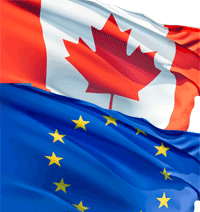 Canada is one of the European Union’s oldest and closest partners. What started out in the 1950s as a purely economic relationship has evolved over the years to become a close strategic partnership.
Canada is one of the European Union’s oldest and closest partners. What started out in the 1950s as a purely economic relationship has evolved over the years to become a close strategic partnership.
The EU and Canada work closely together on global challenges such as the environment, climate change, energy security and regional stability throughout the world. This co-operation stretches from research into alternative energy sources to providing police training in Afghanistan.
European and Canadian representatives meet regularly to exchange views, from yearly bilateral summits of leaders to meetings between officials on specific issues. The EU-Canada Partnership Agenda adopted at the Ottawa Summit on 18 March 2004, identifies ways of working together to move forward, especially where joint action can achieve more than acting alone.
The Partnership Agenda acknowledges the significant evolution of EU-Canada relations because of developments in the EU since 1976 when the relationship with Canada was first formalised through the Framework Agreement on Economic Co-operation. This was the first formal agreement of its kind between what was then the EEC and an industrialised third country.
In addition to trade relations, other policy sectors are also important in the relationship: cooperation in justice and home affairs, science & technology, education & training.
The 2004 Partnership Agenda builds on an established track record of economic and political co-operation between the EU and Canada:
A Declaration on Transatlantic Relations was then adopted in 1990, extending the scope of their contacts and establishing regular meetings at Summit and Ministerial level.
And at the 1996 Ottawa summit, the new Political Declaration on EU-Canada Relations adopted joint Action Plan identifying additional specific areas for cooperation.
The yearly summits between the Presidents of the European Commission and the European Council and the Prime Minister of Canada are the apex of the EU-Canada dialogue. The preparation and follow-up of EU-Canada summits is carried out by officials in the framework of the EU-Canada Co-ordination Group, which was created under the 2004 Partnership Agenda and meets roughly four times a year. EU-Canada Foreign Ministers’ meetings are also held on an annual basis.
In foreign and security policy, the EU and Canada draw on a shared commitment to effective multilateral institutions and effective global governance to project our common values on the world stage, for example by working together for the full establishment of the jurisdiction of the International Criminal Court. An Agreement establishing a framework for the participation of Canada in the EU crisis management operations was also signed in 2005. Canada is a regular contributor to the EU’s ESDP missions participating in up to 4 missions simultaneously: EU Police Missions in Afghanistan (EUPOL Afghanistan), in the Palestinian Territories (EUPOL COPPS) and in Bosnia and Herzegovina, EU Election Observer Missions (EOMs) most recently in Pakistan, the Democratic Republic of Congo, and Aceh, and in the EU Rule of Law Mission (EULEX) in Kosovo.
The 2008 EU-Canada Summit declaration underlined that cooperation in civilian and military crisis management is a key part of developing joint approaches to regional issues. Accordingly, regular consultations are held between the EU Institutions and Canada’s own crisis management entity, known as “START”.
Under the EU’s Industrialised Countries Instrument for 2007-2013, over € 5 million are earmarked for the cooperation with Canada under 2 focal areas: people to people and cooperation. Following an Annual Work Programme, tenders or calls for proposals for the various instruments (EU Centres of Excellence, people to people actions and outreach activities) are published on that same website and are opened to EU and Canadian participants.
Canada is currently the EU’s 11th most important trading partner, accounting for 1.6% of the EU’s total external trade in 2010. The EU is Canada’s second most important trading partner, after the U.S., with a 10.5% share of its total external trade. The value of bilateral trade in goods was € 46.6bn in 2010, with high value-added products such as machinery, transport equipment and chemicals making up 45% of the EU’s exports of goods to Canada and 33% of its imports of goods from Canada. Trade in services, particularly travel and transportation, is an important area of the trade relationship.
Canada is an important, longstanding trade partner for the EU, with a rules-based multilateral trading system. Trade in goods:
[list_icon color=blue type=icon_ticked]
- EU exports of goods to Canada in 2010: €26.6bn
- EU imports of goods from Canada in 2010: €20.1bn
[/list_icon]
EU Canada goods trade is dominated by high-value goods such as machinery, transport equipment and chemicals.
Trade in services:
[list_icon color=blue type=icon_ticked]
- EU exports of services to Canada in 2010: €12.3bn
- EU imports of services exports from Canada in 2010: €9.1bn
[/list_icon]
Foreign direct investment:
[list_icon color=blue type=icon_ticked]
- EU investment flows to Canada (2009): €-4.1bn
- Canada investment flows to EU (2009): €27.7bn
- EU investment stocks in Canada (2009): €157bn
- Canada investment stocks in EU (2009): €119bn
[/list_icon]
